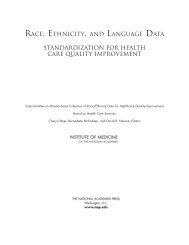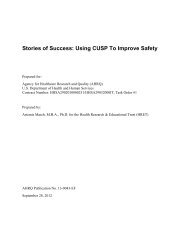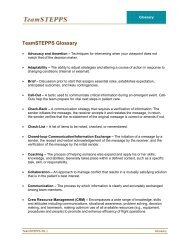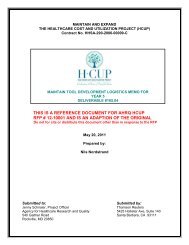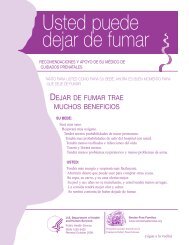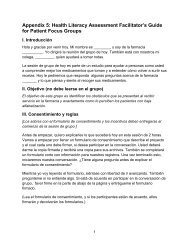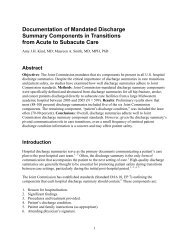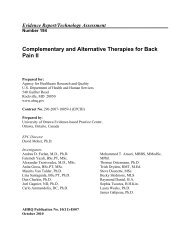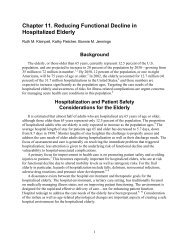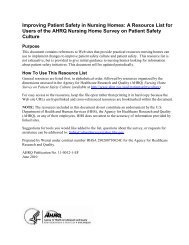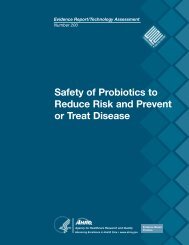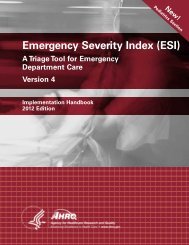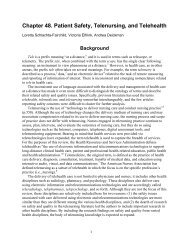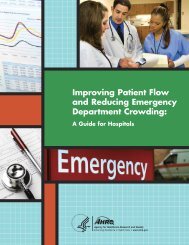Chapter 46. Magnet Environments for Professional Nursing Practice
Chapter 46. Magnet Environments for Professional Nursing Practice
Chapter 46. Magnet Environments for Professional Nursing Practice
You also want an ePaper? Increase the reach of your titles
YUMPU automatically turns print PDFs into web optimized ePapers that Google loves.
16<br />
Evidence Table 2. Studies Comparing Health Care Organizations With and Without ANCC <strong>Magnet</strong> Recognition<br />
Source<br />
Aiken, Havens,<br />
and Sloane<br />
2000 56<br />
Friese 2005 46<br />
Environment<br />
Issue/Attribute Related<br />
to Clinical <strong>Practice</strong><br />
NWI-R single items and<br />
subscales, Aiken et al.:<br />
• nurses’ autonomy<br />
• nurses’ control over the<br />
practice setting<br />
• nurse relations with<br />
physicians<br />
<strong>Practice</strong> Environment<br />
Scale/<strong>Nursing</strong> Work Index<br />
(PES/NWI), Friese:<br />
• nurse participation in<br />
hospital affairs (9 items)<br />
• nursing foundations <strong>for</strong><br />
quality of care (10 items)<br />
• nurse manager ability,<br />
leadership, and support of<br />
nurses (5 items)<br />
• staffing and resource<br />
adequacy (4 items)<br />
• collegial nurse-physician<br />
relations (3 items)<br />
Other measures:<br />
• job characteristics (hours<br />
worked, workload,<br />
supervisory responsibilities,<br />
nonnursing duties)<br />
Havens 2001 36 NWI-R subscale:<br />
• organizational support<br />
Other measures:<br />
• degree restructuring<br />
implemented, 9 items<br />
Design<br />
Type<br />
Crosssectional<br />
studies<br />
Crosssectional<br />
studies<br />
Study Design<br />
& Study Outcome<br />
Measure(s)<br />
Cross-sectional,<br />
comparative multisite<br />
observational<br />
Outcomes:<br />
• perceived quality of<br />
care<br />
• job satisfaction<br />
• intent to leave<br />
• burnout (Maslach<br />
Burnout<br />
Inventory)<br />
Cross-sectional survey;<br />
comparative<br />
Outcomes:<br />
• difficulty recruiting<br />
staff RNs (1 item)<br />
• quality of patient<br />
care (global ratings<br />
and reports of<br />
complaints)<br />
Study Setting<br />
& Study Population<br />
1998 data collection<br />
7 ANCC <strong>Magnet</strong>s (census as<br />
of study date), 13<br />
reputational magnets (12<br />
from Kramer et al.’s 1985–86<br />
sample) with 2 additional<br />
teaching hospitals included<br />
in Friese’s secondary<br />
analysis<br />
Aiken et al. survey n = 2,045<br />
RNs in medical or surgical<br />
units, 1,064 in ANCC <strong>Magnet</strong><br />
and 981 in reputational<br />
magnet group<br />
Friese analysis n = 1,956 of<br />
which 305 = oncology nurses<br />
(155 in ANCC <strong>Magnet</strong> and<br />
150 in comparison group)<br />
and 1,651 = nononcology<br />
nurses (755 in ANCC<br />
<strong>Magnet</strong> and 896 in<br />
comparison group)<br />
1999–2000 data collection<br />
21 ANCC <strong>Magnet</strong>s, 35<br />
reputational magnet<br />
hospitals (census samples of<br />
both groups)<br />
Survey n = 43 chief nurse<br />
executives, 19 in ANCC<br />
<strong>Magnet</strong> and 24 in<br />
reputational magnet group<br />
Key Finding(s)<br />
Nurses in ANCC <strong>Magnet</strong>s were<br />
significantly more likely to report<br />
• higher ratings of care quality<br />
• higher job satisfaction<br />
• less frequently feeling burned<br />
out, emotionally drained, and<br />
frustrated by their job<br />
Oncology nurses in ANCC<br />
<strong>Magnet</strong>s reported nearly half the<br />
exhaustion levels of oncology<br />
nurses in the 13 reputational<br />
magnets and 2 teaching<br />
hospitals.<br />
In both analyses, most NWIrelated<br />
subscale scores were<br />
significantly higher <strong>for</strong> nurses in<br />
the ANCC <strong>Magnet</strong> group;<br />
exceptions were that scores <strong>for</strong><br />
nurse-physician relations and<br />
nurse manager ability,<br />
leadership, and support differed<br />
significantly, favoring ANCC<br />
<strong>Magnet</strong>s only <strong>for</strong> oncology<br />
nurses.<br />
Chief nurse executives in the<br />
ANCC <strong>Magnet</strong> group reported<br />
less difficulty recruiting RNs and<br />
were significantly more likely to<br />
report<br />
• high quality patient care<br />
• fewer patient/family<br />
complaints<br />
• organizational support <strong>for</strong><br />
autonomy, control over<br />
practice, and nurse-physician<br />
collaboration<br />
Patient Safety and Quality: An Evidence-Based Handbook <strong>for</strong> Nurses



